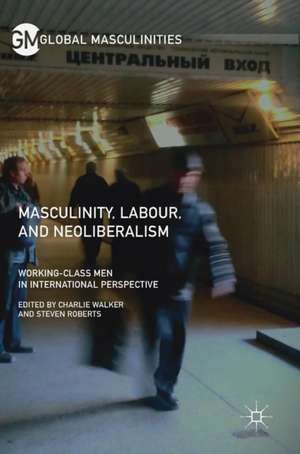Masculinity, Labour, and Neoliberalism: Working-Class Men in International Perspective: Global Masculinities
Editat de Charlie Walker, Steven Robertsen Limba Engleză Hardback – 28 sep 2017
| Toate formatele și edițiile | Preț | Express |
|---|---|---|
| Paperback (1) | 584.96 lei 38-44 zile | |
| Springer International Publishing – 11 aug 2018 | 584.96 lei 38-44 zile | |
| Hardback (1) | 646.11 lei 6-8 săpt. | |
| Springer International Publishing – 28 sep 2017 | 646.11 lei 6-8 săpt. |
Din seria Global Masculinities
- 13%
 Preț: 236.84 lei
Preț: 236.84 lei - 14%
 Preț: 171.64 lei
Preț: 171.64 lei - 13%
 Preț: 238.11 lei
Preț: 238.11 lei - 13%
 Preț: 236.92 lei
Preț: 236.92 lei -
 Preț: 381.98 lei
Preț: 381.98 lei -
 Preț: 390.63 lei
Preț: 390.63 lei -
 Preț: 385.84 lei
Preț: 385.84 lei -
 Preț: 387.75 lei
Preț: 387.75 lei - 15%
 Preț: 493.21 lei
Preț: 493.21 lei -
 Preț: 383.93 lei
Preț: 383.93 lei - 15%
 Preț: 640.71 lei
Preț: 640.71 lei -
 Preț: 384.86 lei
Preț: 384.86 lei -
 Preț: 387.75 lei
Preț: 387.75 lei -
 Preț: 390.63 lei
Preț: 390.63 lei -
 Preț: 388.72 lei
Preț: 388.72 lei -
 Preț: 388.72 lei
Preț: 388.72 lei - 15%
 Preț: 641.85 lei
Preț: 641.85 lei - 15%
 Preț: 697.32 lei
Preț: 697.32 lei -
 Preț: 432.71 lei
Preț: 432.71 lei - 15%
 Preț: 465.80 lei
Preț: 465.80 lei - 15%
 Preț: 693.06 lei
Preț: 693.06 lei - 18%
 Preț: 729.68 lei
Preț: 729.68 lei -
 Preț: 352.63 lei
Preț: 352.63 lei -
 Preț: 392.60 lei
Preț: 392.60 lei -
 Preț: 387.38 lei
Preț: 387.38 lei -
 Preț: 390.63 lei
Preț: 390.63 lei - 8%
 Preț: 386.06 lei
Preț: 386.06 lei
Preț: 646.11 lei
Preț vechi: 760.13 lei
-15% Nou
Puncte Express: 969
Preț estimativ în valută:
123.63€ • 129.08$ • 102.32£
123.63€ • 129.08$ • 102.32£
Carte tipărită la comandă
Livrare economică 05-19 aprilie
Preluare comenzi: 021 569.72.76
Specificații
ISBN-13: 9783319631714
ISBN-10: 3319631713
Pagini: 338
Ilustrații: XVIII, 338 p.
Dimensiuni: 148 x 210 x 25 mm
Greutate: 0.58 kg
Ediția:1st ed. 2018
Editura: Springer International Publishing
Colecția Palgrave Macmillan
Seria Global Masculinities
Locul publicării:Cham, Switzerland
ISBN-10: 3319631713
Pagini: 338
Ilustrații: XVIII, 338 p.
Dimensiuni: 148 x 210 x 25 mm
Greutate: 0.58 kg
Ediția:1st ed. 2018
Editura: Springer International Publishing
Colecția Palgrave Macmillan
Seria Global Masculinities
Locul publicării:Cham, Switzerland
Cuprins
1. Masculinity, Labour, and Neoliberalism: Reviewing the Field.- 2. Men, Masculinity, and Labour-force Participation in Kaduna, Nigeria: Are there Positive Alternatives to the Provider Role?.- 3. Yearning to Labour? Working-Class Men in Post- Industrial Britain.- 4. Formulating the Post-Industrial Self: The Role of Petty Crime among Unemployed, Working-Class Men in Stoke-on-Trent.- 5. Young Working-Class Men without Jobs – Re-imagining Work and Masculinity in a Postindustrial Society.- 6. Becoming a Working-Class Male Adult Learner: Formations of Class and Gender in the Finnish Learning Society.- 7. “I am going to Uni!” Working-Class Academic Success, Opportunity, and Conflict.- 8. Automobile Masculinities and Neoliberal Production Regimes among Russian Blue-Collar Men.- 9. Masculinities, Bodies and Subjectivities: Working-Class Men Negotiating Russia’s Post-Soviet Gender Order.- 10. The Inertia of Masculinity: Narratives of Creative Aspiration among Arab-Australian Youth.- 11. Gender, Neoliberalism, and Embodiment: A Social Geography of Rural, Working-Class Masculinity in Southeast Kansas.- 12. Working-Class Masculinities at the Nexus of Work, Family and Intimacy in the Age of Neoliberalism: Or, Are the Times Really a’ Changin’?.- 13. Driving through Neoliberalism – Finnish Truck Drivers Constructing Respectable Male Worker Subjectivities.- 14. Masculinities and Health Inequalities within Neoliberal Economies.
Notă biografică
Charlie Walker is Associate Professor of Sociology at the University of Southampton, UK. He is the author of Learning to Labour in Post-Soviet Russia: Vocational Youth in Transition and the co-editor of Innovations in Youth Research and Youth and Social Change in Eastern Europe and the former Soviet Union.
Steven Roberts is Senior Lecturer in Sociology at Monash University, Australia. His sole and co-published works include Youth and Social Class: Enduring Inequality in the UK, Australia and New Zealand; Debating Modern Masculinities; Class Inequality in Austerity Britain; Young People and Social Policy in Europe; and Digital Methods for Social Science.
Textul de pe ultima copertă
This book explores the ways in which neoliberal capitalism has reshaped the lives of working-class men around the world. It focuses on the effects of employment change and of new forms of governmentality on men’s experiences of both public and private life. The book presents a range of international studies—from the US, UK, and Australia to Western and Northern Europe, Russia, and Nigeria—that move beyond discourses positing a ‘masculinity crisis’ or pathologizing working-class men. Instead, the authors look at the active ways men have dealt with forms of economic and symbolic marginalization and the barriers they have faced in doing so. While the focus of the volume is employment change, it covers a range of topics from consumption and leisure to education and family.
Caracteristici
Adopts an intersectional approach to answering questions about the topic Develops the critical study of men and masculinities as a truly global field of inquiry Highlights and draws a distinction between the forms of adaptation currently being demanded of working-class men in relation to processes of neoliberalization
